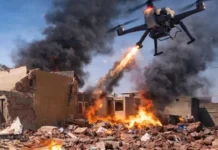Sudan grapples with a worsening cholera crisis, reporting 2,300 cases in just three weeks. The situation is dire, especially in Greater Khartoum. Due to drone attacks on power plants in Omdurman, water treatment stations no longer have electricity and cannot provide clean water from the Nile. Doctors Without Borders/Médecins Sans Frontières (MSF) currently supports seven cholera treatment units in Khartoum state.
OMDURMAN MAY 24: Sudan grapples with a worsening cholera crisis, reporting 2,300 cases in just three weeks. The situation is dire, especially in Greater Khartoum, as war and infrastructure damage exacerbate the outbreak. This is not the first time that Sudan or Khartoum has been affected by the disease, but the conflict has clearly compromised basic infrastructure, and this upsurge of cholera cases is definitely one of the consequences of the war.
There are several reasons for the ongoing cholera outbreak, but for sure the difficulty of access to safe drinkable water is one of them. Due to drone attacks on power plants in Omdurman, water treatment stations no longer have electricity and cannot provide clean water from the Nile.
People in other parts of the city, such as southern Khartoum and Jabal Awliya locality, are deprived of access to drinkable water and electricity. That might explain why these are some of the heavily affected areas.
Doctors Without Borders/Médecins Sans Frontières (MSF) currently supports seven cholera treatment units in Khartoum state and several oral rehydration points.
Cholera is an infection of the small intestine by some strains of the bacterium Vibrio cholerae. The classic symptom is large amounts of watery diarrhea lasting a few days. Vomiting and muscle cramps may also occur. Diarrhea can be so severe that it leads within hours to severe dehydration and electrolyte imbalance. Symptoms start two hours to five days after exposure.









